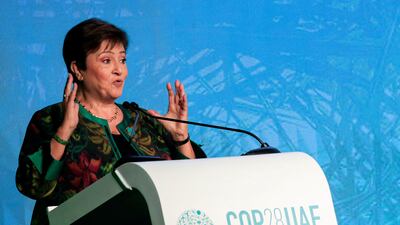Live updates: Follow the latest news on Cop28
The International Monetary Fund's chief has called on governments to remove fossil fuel subsidies to accelerate decarbonisation goals.
Direct and indirect fossil-fuel subsidies surged to a record $7.1 trillion in 2022, as governments supported consumers and businesses during the global spike in energy prices, Kristalina Georgieva said at Cop28 in Dubai on Saturday.
Governments should redirect these funds towards infrastructure that allows decarbonisation and climate-related research and development.
“We believe that with a package of measures that include carbon pricing, elimination of harmful subsidies and policy support that would bring an acceleration of decarbonisation in a meaningful way, we can still make this decade one where we can take pride in our actions,” she told the Business and Philanthropy Climate Forum.
International Monetary Fund
Ms Georgieva also urged the private sector to move quickly to increase their climate mitigation investment, particularly in developing countries.
Emerging markets and developing economies currently emit around two thirds of greenhouse gases, according to the IMF.
The private sector will need to inject about 80 per cent to 90 per cent of the required investment, Ms Georgieva said.
“We need $5 trillion to make decarbonisation a reality and the question is, is $5 trillion, a lot of money?”
“Well, it’s obviously not a little but put $5 trillion next to $7.1 trillion direct and indirect subsidies, or next to the size of the world economy, which is over 100 trillion [dollars]. I think we should be brave and say yes, it can be done.”
The IMF boss said she is “optimistic” that the world is gradually moving towards blended finance “in a meaningful way but we just have to go a little faster”.
Blended finance is the use of development finance to mobilise additional funds towards sustainable development in developing countries.
It attracts commercial capital towards projects that contribute to sustainable development while providing financial returns to investors.
This approach helps increase the total amount of resources available to developing countries, complementing their investments to fill their SDG financing gap and support the implementation of the Paris Agreement.
Carbon pricing
Ms Georgieva also called for wider use of carbon pricing as part of the package of climate mitigation measures.
Carbon taxes are one of the most powerful and effective tools at governments' disposal, particularly for large emitting countries, in keeping with climate goals, according to the IMF.
Countries have made some progress, with coverage of carbon pricing now close to 25 per cent, up from 10 per cent a decade ago, Ms Georgieva said.
Average carbon prices are also increasing in areas where they exist, reaching $20 per ton.
But taking into account the areas that do not implement carbon pricing and amalgamate them, the average carbon price falls to $5 per ton.
However, carbon pricing needs to reach at least $85 a ton by 2030, making it a “long way to go” to reach these levels, she said.
Cop28 begins at Expo City Dubai - in pictures
Carbon pricing is a “wonderful instrument” because it addresses inequalities so that the biggest emitters are paying for their consumption, but also creates revenue that governments can use to help vulnerable groups of the population, she said.
“Carbon price is a very strong incentive, much stronger than anything else we can invent,” she said.
The IMF boss urged the US to adopt carbon pricing “rather than being a loud opponent” to the tool.
“If you have to do it with standards and regulatory frameworks, then do it in that way but please do it, don't prevent the world from moving in the right direction,” she added,
The IMF's new $40 billion Resilience and Sustainability Trust, which provides long-term financing on affordable terms to help vulnerable middle- and low-income countries cope with threats such as climate change, has already supported programmes for 11 countries, Ms Georgieva said.
She praised the UAE's move to pledge $200 million to help climate resilience in vulnerable countries.
The IMF boss issued a rallying cry for action on climate change.
“Not acting with all the force we have to change the direction of our societies is definitely not the right thing to do. The right thing to do is act,” she concluded.











